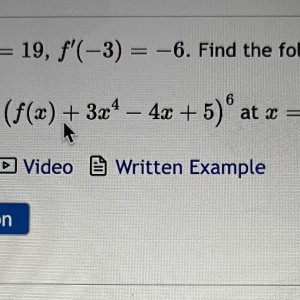Derivatives again. Thank you!
Answer
Answers can only be viewed under the following conditions:
- The questioner was satisfied with and accepted the answer, or
- The answer was evaluated as being 100% correct by the judge.
574
-
Both were wrong. I get one more try
-
A minus sign was missing in the final answer. Please try again. It should work now.
-
-
It didn’t work. The answer was 6(19+260)^5(-6-328). I ran out of fund, I’ll try to redo a different one on my own
-
My answer is the same as 6(19+260)^5(-6-328). Probably it is did not accept it because of the format of the answer. 6(19+260)^5(-6-328)=6(279)^5(-334), same as my answer.
-
The answer is accepted.
Join Matchmaticians Affiliate Marketing
Program to earn up to a 50% commission on every question that your affiliated users ask or answer.
- answered
- 1287 views
- $3.00
Related Questions
- 3 Multi-step response questions
- Convergence of $\int_{1}^{\infty} e^{\sin(x)}\cdot\frac{\sin(x)}{x^2} $
- Finding the arc length of a path between two points
- The cross sectional area of a rod has a radius that varies along its length according to the formula r = 2x. Find the total volume of the rod between x = 0 and x = 10 inches.
- Explain what the problem means in laymens terms.
- Help with Norms
- Not sure what I'm doing wrong
- Solve this business calculus problem please.

